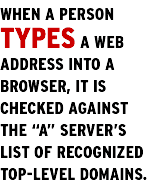| |||||||||

A switch to an alternative Internet?
 Businesses that have supported nonstandard Internet domain names for
years--with suffixes such as ".cars" and ".family"--have decided to launch
a campaign for an "alternative Internet" on Sunday. Businesses that have supported nonstandard Internet domain names for
years--with suffixes such as ".cars" and ".family"--have decided to launch
a campaign for an "alternative Internet" on Sunday. Bradley Thornton, chief technology officer for southern California consulting company Joint Technologies, says his company has hired a Los Angeles public relations company to announce the effort that day. According to Thornton, starting on Sunday, Joint Technologies will allow Web sites around the world to register new names ending in ".food," ".kids," ".ocean" and other choices. The campaign relies on an alternative computer system maintained by the Open Root Server Confederation (ORSC). ORSC is a consortium of companies that has for years run servers that support new suffixes, in some cases since 1995. These servers were informally inspired by the old Internet Assigned Numbers Authority (IANA), an early Internet coordinating body founded by Jonathan Postel at the University of Southern California. In December 1996, Postel published a list of more than 100 proposed new suffixes. But Postel died of heart failure in October 1998, and the new names never took their place alongside ".com," ".net," ".org" and other suffixes now commonly used.
ORSC poses a direct challenge to the Internet Corporation for Assigned Names and
Numbers (ICANN). ICANN is a nonprofit corporation that contracted in
October 1998 with the U.S. Department of Commerce to run IANA and other
aspects of Internet policy-making. The root server that ICANN governs, known as the "A" root server, is operated and maintained in Virginia by Network Solutions (NSI). When a person types an Internet address into a Web browser, the address is checked against the A server's list of recognized top-level domains, or TLDs. The A server's list includes all the familiar suffixes, such as ".com." But the list doesn't include the ORSC's alternative servers that have been supporting new domains, such as ".web." ICANN began accepting applications last month from companies that seek to manage additional domains. More than 40 proposals were received by the group's Oct. 2 deadline. ICANN's board won't determine the winners of the competition until its next meeting Nov. 13-16 in Marina del Rey, Calif. Members of the rival confederation say several Internet service providers will switch to ORSC's alternative before then. Richard Sexton, an early Internet pioneer, operates the ORSC's alternative root server at VRX Network Services in Ontario, Canada. He says the chief executive of at least one major ISP--which he wouldn't identify--has already decided to switch from ICANN's server to ORSC's. Such a switch is surprisingly easy. There is no technical requirement that the Internet's only root server be the A server in Virginia. To use a different root server, an ISP merely edits a couple of lines of in-house computer code. This change allows the ISP's subscribers to browse all of ORSC's Web locations, including ".cars," ".family" and others. Yet the same browsers will still work with all of ICANN's TLDs, such as ".com," ".net" and ".org." The switch can even be made by individuals on their personal computers, regardless of the ISP they use. The process is described in a document by the SuperRoot Consortium, a group that supports the ORSC. ICANN is in a self-imposed "quiet period" while it evaluates the proposals it received for new TLDs and won't comment on those proposals or ORSC's. But an important committee within ICANN's structure, the Names Council--consisting of registrars and other Internet businesses--recently issued its own warning statement. "The Names Council feels it is premature for companies to offer preregistration services for domain names in speculative new TLDs," the statement said. Next week, this column will evaluate the proposals received by ICANN--which include applications to run ".info," ".site," ".sex," ".xxx" and others--and their possible effect on the Internet. Consumer advocate Brian Livingston appears at CNET News.com every Friday. Do you know of a problem affecting consumers? Send info to tips@BrianLivingston.com. He'll send you a book of high-tech secrets free if you're the first to submit a tip he prints.
Bullpen penner |
|
|||||||||||||||||||||||
|
Send us news tips | Contact Us | Corrections | Privacy Policy |
|

